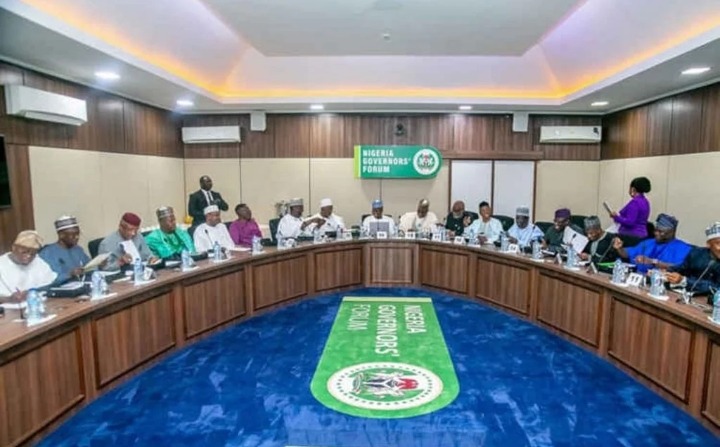Headline
Inflation: Governors To Meet Buhari Over Economic Woes, Insecurity

Worried by the economic woes in the country, the 36 governors will on Wednesday, 17th August, 2022, meet at the Banquet Hall of the Presidential Villa in Abuja, to discuss the way forward.
Abdulrazaque Bello-Barkindo, the Director, Media and Public Affairs of Nigeria Governors’ Forum Secretariat, in a statement, on Tuesday, declared that the state of the nation’s economy will dominate conversations during the meeting.
According to the statement, “several governors reasoned that it is high time to tell each other the bare truth by confronting each other on the situation and brainstorming on it.”
Continuing, the statement noted that: “This formed the basis for resorting to an in-person meeting which since the outbreak of the Covid-19 pandemic has been relegated by the states’ executives.
READ ALSO: Nigeria’s Debt To World Bank Rises By $660m
“Two things will feature prominently in the conversation: the economy and security. This will be the first time in the year, contrary to media reports that Governors had collectively advised the president on the weeding of fifty-year-olds from the federal civil service and other spurious suggestions meant to impose further hardship on the people, that governors will collectively meet to consider a total overhaul of the nation’s economy.
“The meeting which, according to the invitation issued by the Director-General of the Nigeria Governors’ Forum, Mr Asishana Bayo Okauru, will commence at 2 pm. It begins with the launch of the Primary Health Care Leadership Challenge Fund, followed by the launch of the World Bank SFTAS charter before the real conversation on the state of the economy begins.
“There will also be such regular updates as the CARES program and the Chairman’s remarks. All governors are warmly welcome.”
Headline
U.S. Lawmaker Reacts To Nigeria, U.S. Airstrikes

United States Congressman, Riley Moore, has stated that President Donald Trump is determined to put an end to the killing of Christians in Nigeria, warning that further action may follow if the violence persists.
Moore made the statement on Friday via his official X handle.
According to the lawmaker, the strike represents the first step in addressing what he described as the ongoing slaughter of Christians and the broader security crisis affecting Nigerians across religious and ethnic lines.
READ ALSO:US Dept Of War Shares Video Of Air Strikes In Nigeria
“President Trump has been clear that the killing of Christians in Nigeria must end,” he said.
He that the administration’s resolve on the matter should not be underestimated.
“As I stated at the outset: Do not test President Trump‘s resolved in this matter.
READ ALSO:JUST IN: US Forces Bomb Terrorists Camps In Nigeria
“Tonight’s strike in coordination with the Nigerian government is just the first step to ending the slaughter of Christians and the security crisis affecting all Nigerians,” he said.
He stressed that the operation signals a stronger stance by the United States in support of Nigeria’s efforts to tackle terrorism and violent extremism, noting that further measures could be taken if the situation does not improve.
Headline
US Dept Of War Shares Video Of Air Strikes In Nigeria

A video footage of the US military air strikes in Nigeria has emerged.
The video was released by the US Department of War following its air strikes against terrorists in Sokoto.
Earlier, the US secretary of War, Pete Hegseth had confirmed that military air strikes hit terrorists in Nigerians, saying it was deadly.
Later on, the US. African Command, confirmed that it conducted the attacks described as very deadly by President Donald Trump.
Trump said he was only keeping the promise he made earlier last month to strike the terrorists he believes are killing innocent Christians.
READ ALSO:JUST IN: US Forces Bomb Terrorists Camps In Nigeria
Although described as powerful and deadly, the casualty caused by the attack is yet to be released.
Explaining further, security expert, Brant Philip, said the strikes may have been launched “from the USS Paul Ignatius, using a Tomahawk missile.”
The Nigerian government through its ministry of foreign affairs has also confirmed that the strikes were successful.
Watch video here
Headline
JUST IN: US Forces Bomb Terrorists Camps In Nigeria

United States President Donald Trump said US forces conducted deadly strikes against Islamic State terrorists in northwestern Nigeria, and vowed more attacks if the militants keep killing Christians.
“I have previously warned these Terrorists that if they did not stop the slaughtering of Christians, there would be hell to pay, and tonight, there was,” Trump posted on his Truth Social platform, adding that “the Department of War executed numerous perfect strikes.”
READ ALSO:JUST IN: Kano Lawmaker, Sarki Aliyu Daneji, Dies Hours After Colleague’s Passing
Trump stated that the Department of War “executed numerous perfect strikes, as only the United States is capable of doing. Under my leadership, our Country will not allow Radical Islamic Terrorism to prosper.”
The US president wished everyone Merry Christmas, “including the dead Terrorists, of which there will be many more if their slaughter of Christians continues.”
Details later.

 News4 days ago
News4 days agoPHOTOS: New Era In Furupagha-Ebijaw As Okpururu 1 Receives Staff Of Office

 News3 days ago
News3 days agoUBTH CMD Marks 120 Days In Office, Expresses Commitment To Providing Conducive Working Environment

 News4 days ago
News4 days agoOPINION: Gumi And His Terrorists

 News4 days ago
News4 days agoFIRS Confirms NIN As Tax ID

 News4 days ago
News4 days agoFG Declares Public Holidays For Christmas, New Year Celebrations

 Metro3 days ago
Metro3 days agoFintiri Pardons Man Sentenced To Death For ‘Killing Herdsman In Self-defence’, Others

 News4 days ago
News4 days agoOPINION: Christmas And A Motherless Child

 News2 days ago
News2 days agoJUST IN: Kano Lawmaker, Sarki Aliyu Daneji, Dies Hours After Colleague’s Passing

 News4 days ago
News4 days agoOPINION: My Man Of The Season

 News4 days ago
News4 days agoKWAM 1 Withdraws From Awujale Race, Ends Court Challenge






























